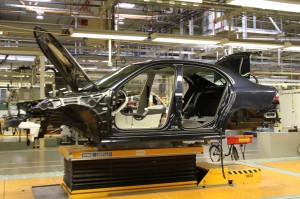With its new investors on board and a new chief operating officer in place to direct its business in the U.S., Saab AB expects to restart its main assembly plant in Trollhattan Sweden, the company’s chief shareholder and acting chief executive officer told TheDetroitBureau.com.
Victor Muller, Saab’s acting CEO, also said he expects to recruit a new, permanent CEO soon and took responsibility for the recent confrontation with suppliers that forced Saab to close the Trollhattan plant and undermined the company’s reputation.
“I blame myself for what happened,” Muller said during an unusually candid moment before a dinner with journalists in Washington D.C. Muller earlier told TheDetroitBureau.com that when suppliers threatened to halt deliveries over unpaid bills he decided to resist – to unexpected results.
Earlier this year, Saab was beginning the transition away from the GM’s purchasing organization, which meant that the terms and conditions of specific contracts were also in flux. As the terms began to change, some of the suppliers balked and in Muller’s words he decided “to call the bluff” of one key supplier.
The results were a disaster for Saab as the supplier “kept the doors of its trucks closed,” and 92 other suppliers joined what amounted to a strike against Saab. The shutdown cost Saab more than $20 million, and forced Saab to look for new financing. Production of as many as 1,000 cars a week was lost, though Muller has said this could be made up in the coming months.
The problem was coming up with the necessary cash to end the boycott once the supplier strike began. Several proposals were rejected by the European Investment Bank, which loaned Muller’s consortium the money it needed to finance the acquisition in early 2009.
Fortunately, Saab was able to find new cash by striking a deal with the Chinese automaker Hawtai. Several other Chinese automakers also expressed interest in Saab, Muller revealed.
“The Chinese love European premium brands. Fortunately for us we were the last one available. There are no more,” added Muller, who said he was negotiating with three different Chinese companies simultaneously.
In the end, he chose Hawtai Motor Group, which is based in China’s Shendong Province, because it offered the best possibilities for the future. Hawtai has deep pockets and last year spent $750 million to build a new factory to make small, clean diesel engines, he noted.
Eventually, Saab plans to start producing vehicles in China and may even develop a big SUV for that market, Muller last week told TheDetroitBureau.com.
More immediately, the Swedish maker is preparing to relaunch production at the Trollhattan plant as soon as next week while, moving ahead with the launch of the new GM-built 9-4X crossover vehicle in the US, Muller said.
GM has built several pre-production prototypes of the 9-4x for Saab and began production for retail dealers this week, Muller said.
GM is Saab’s largest supplier and was very supportive during Saab’s recent financial crisis, Muller said.
Getting the Trollhattan plant, which builds both the 9-3 and 9-5 sedans, going again will require the cooperation of suppliers who have halted shipments since the end of March. But they are cooperating and the plant should be ready to build vehicles again next week, Saab officials said.
Paul A. Eisenstein contributed to this report.

